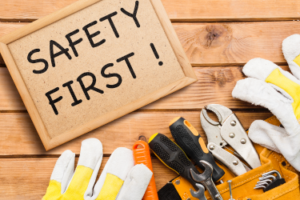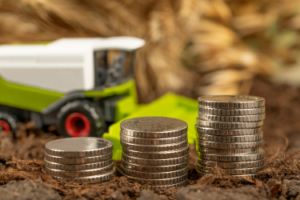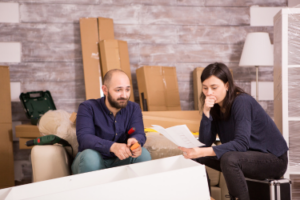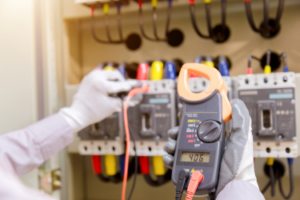Are you thinking about investing in property? Many people will be thinking about investing in property as an extra income on top of their regular job.
It might seem simple at first; you buy a property, rent it out for five years then sell it and turn a nice profit. It isn’t quite as simple as it may seem and there are a number of steps you should take when considering moving into the property investment market.
What do you want to get out of it? How will you finance it? Are you prepared to be a landlord or do the work to improve your property? This article will give you a brief overview of property investment for beginners, the risks and how to best go about doing it.
What do you want to get out of it?
There are lots of reasons why people invest in property. It could be to purchase a new build to improve and sell on for profit or it could be to buy a property to rent out in an area where people may prefer to do that.
This piece will mainly focus on buy-to-let investment, but you need to have a good idea in mind as to what the end goal is. Don’t just buy a property with the idea of making money. Have a clear idea as to exactly how you will do that, and that is where the rest of this article should give you a clearer idea of that vision and how to execute it.
Expenses and risks
Firstly, a number of factors need to be considered when purchasing a property. There are lots of costs on top of the obvious purchasing of the property and resulting mortgage that should be kept in mind.
- Stamp duty land tax
- Getting a mortgage
- The day to day running of the property
- Current property prices on the market, is now a good time to buy?
- Survey costs
- Solicitor fees
- Insurance
As you can see, there are additional costs such as Stamp Duty tax and survey costs that you may not have anticipated. Tax is perhaps an obvious one, but safety is very important meaning surveys and inspections are essential. It’s always better to be prudent and careful with these things. Even though it may cost you in the short term to have elements of a property checked, it will save you in the long run.
How will you finance your investment?
You may already be in a comfortable enough position to invest where money isn’t too much of an object. However, as you will have read in the previous section, there are a number of costs and you may need to get financial support from elsewhere.
Do you have any friends who are also thinking about investing, paying the way by joint venture is certainly an option. As with most property purchases you can get a mortgage, but be wary that if you decide to rent the property out and this is your source of mortgage repayments then it could be out of your hands at times if the rent doesn’t come in on time.
If you are in any position of debt and thinking of using this as a way of getting out of it, even if it’s a lingering student loan debt for example, we would advise against property investment as it will only result in more debts and loans. You will need to have some sort of cash in-hand as investment properties typically require a larger down payment than that of a regular purchase, often up to 20%.
Selecting the right investment
In line with the previous section about what you want to achieve, selecting the right investment is important. If you’re looking for a buy-to-let property you don’t want to get a property in a location that wouldn’t attract many renters. Similarly if you’re investing in real estate in an area that people generally look to rent in and you’re looking to sell the property once improving it then you may find it tricky.
If you’re thinking of letting and becoming a landlord, the location is even more important than any other investment plan. Your tenants will need support, problems may occur and you’ll need to be able to travel to and from the property.
The location will affect the costs. How much will they cost to buy? What are the rental prices like in the area? These are just a couple of the questions you’ll have to consider. As with any important decision, don’t rush into anything. Make sure you’ve done as much research as possible on the estate before settling on it.
Being a landlord
Continuing from the last point about needing to be available as a landlord to your tenants, being a landlord isn’t easy. You’ll be dealing with people at this point rather than simply money and physical property. Striking a good balance between care/sympathy and strict behaviour is vital. Your tenants will need to feel comfortable in their home but they need to be paying you rent.
Of course, you can get other people to fix problems that occur at the property for your tenants, but it’s important and very useful to have a basic understanding of property components. If you are able to drop by and quickly fix something for your concerned tenants rather than calling a professional out then it could save you a lot of time, money and hassle. If you are considering a buy-to-let property then you should be prepared to be a versatile and willing landlord with good knowledge of the property.
You’ll also have to have a good knowledge of your legal obligations. Safety/security checks, tenant rights, deposits, fair housing, everything. Be prepared to seek legal advice when drafting up documentation and contracts. Be clear and up front with your tenants to avoid any disputes in this regard.
Identify target tenants and set pricing
If you do decide on a buy-to-let investment then from here you’ll have to work out how much money you’ll need coming in and what prices you would be able to demand from your tenants. With this in mind, you’ll need to have an idea of the type of tenant you foresee living in the space. Again, location could be a big factor here. If it’s in a university town then you might be more likely to rent the property out to students, in which case you’ll need to bear in mind their financial restrictions.
The rental price will be entirely dependent on the area and the state of the property. If you purchase a run down property but are able to do it up then you might be able to set the price higher than what would have initially been feasible. Compare your proposed pricing to others in the same condition/area and make sure you’re along the right lines. A misjudgement on pricing your rental fees could result in a lack of interest in your property, meaning a negative reflection on your financial returns.
Protecting your investment
A property is an investment like any asset, you’ll need to protect it. Ensure it stays in good health while tenants are living there. As a landlord, you should check-in regularly and carry out safety inspections. Another important way of protecting what is yours is through the property inventory. It isn’t just the walls of the property that are yours, you will own a certain amount of extras, whether it’s appliances or a sofa. Have a list of what is yours in the rental agreements and contracts to ensure the value of these assets are maintained and you can claim expenses/damages inflicted upon any of it.
Don’t hesitate to contact us if you have any more questions about property investment and be sure to check out our services, including our dedicated inventories and inspections service. We are facilities management experts, so there isn’t anyone better to contact for support!




